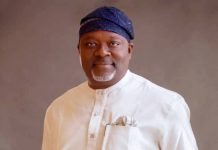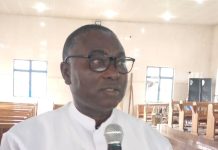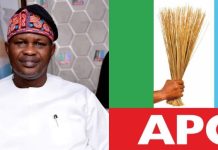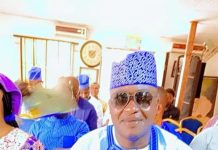
For religion to be an instrument of peace and progress in Nigeria, political leaders must desist from weaponising religion to achieve their selfish, narrow and devilish ends
This was the submission of members of the Islamic Welfare Foundation (IWF) at the 11th Conference on Islam in Nigeria (COIN) themed ‘Religion and Politics in Nigeria’ in collaboration with Ekiti State University (EKSU) held on 7th-10th November 2022.
According to the statement by Dr. Hassan Kalejaiye, IWF National Coordinator and Dr. Abdulkarim Oloyede, IWF National secretary, the conference was attended by a cross section of scholars, religious leaders, stakeholders, and academics from across the country.
The opening ceremony featured two keynote speeches and two lead papers around the theme of the conference.
The participants deliberated extensively on this theme and several other sub-themes of the conference, and the following observations and recommendations were made:
Observations
- Nigeria is said to be the second most religious country in the world. Therefore, a lot of issues including politics are influenced by religion. Concomitantly, Nigerians tend to vote along religious lines rather than looking out for competence in people seeking political positions
- Religion cannot be separated from politics in Nigeriabut their interplay can put the nation on the right or the wrong developmental trajectory.
- There exist inter-faith organizations in Nigeria such as Nigeria Inter-Religious Council (NIREC)whose raison d’être is to forge collaboration between the adherents of different religions to promote national development.
- There is a high proclivity among Nigerian politicians to weaponise religion to gain power unlawfully thereby subverting the will of the people and enthroning illegitimategovernment which in turn leads to bad governance.
- Nigeria is often wrongly labeled as a secular country to connote the notion that she is a country that has nothing to do with any religion when, in fact she has something to do with several religions and, therefore, should be appropriately labeled as a ‘multi-religious state’.
- Most Nigerian politicians erroneously believe that it is neitherAllah (God) nor the people that give power and hence resort totheir own devises to acquire and exercise power. Consequently, they do not feel they are accountable to Allah (God) and the people.
- Many adherents of divine faiths have compromised their worship of the Almighty by breaching divine laws to appease men of power and wealth.
Recommendations
1 Stakeholders in the Nigerian project should adopt it as their major responsibility to enlighten the citizenry that political leaders should not be selected on the basis of their religion; rather they should be chosen on their ability and capability to deliver on their mandate.
2 Religious leaders should uphold the universal brotherhood of mankind to be above all other forms of relationship and, therefore, eschew all forms of discrimination.
3 NIREC and similar organisations to deepen their commitment to religious tolerance, unity, and progress of Nigeria.
4 Religious leaders are under divine obligation to speak the truth always and hence must speak the truth to both the leaders and the led. However, hobnobbing with men of means and power has compromised the ability of religious leaders to speak truth to power without fear or favour. Religious leaders are enjoined to always speak the truth to both the leaders and the led so that they can fulfill their mandate as the moral conscience of the society.
5 Religion is about the spiritual and material welfare of the people. We therefore call on religious leaders to be totally committed to welfare of the people and use their platform tourge political leaders towards the fulfillment of their electoral promises as such promises are not covenants between them and the people alone but are alsosacred covenants between them and Allah (God).
6 Given that the separation of state and religion has never been achieved anywhere in the world and that the Nigerian constitution only forbids the adoption of one religion as state religion, the logical conclusion is that Nigeria is a multi religious state. Also, the notion of secularism as separation state and religion is false and unattainable. Therefore, reference to Nigeria as a secular state should be discarded forthwith.
7 Nigeria is perfunctorily a multi-religious society; there is no part of the country that is exclusively inhabited by the adherents of any one religion. Therefore, Nigeria cannot disunite on the basis of religious differences. The principle of ‘live and let live’ with which we manage religious pluralism within families and native communities should be deployed to manage religious pluralism in Nigeria and thereby promote the unity of the country.
8 Impunity, reinforced by immunity, is a major bane of progress in Nigeria. But every religion preaches that there is neither impunity nor immunity before the Almighty. Religious leaders should use their good offices to vigorously campaign against impunity and irresponsible use of immunity in the country.
9 Corruption has widened and deepened in Nigeria in recent time and has indeed become an existential problem. All hands must be on deck to eradicate corruption in the country lest it will eradicate the country from the surface of the earth. The three arms of government need to up their game in fighting corruption while religious leaders should neither facilitate nor condone corrupt practices and individuals in any guise.
Conclusion
Religion is a two-edged sword in politics; it can build as much as it can destroy. Allah’s purpose for Islam (religion) is to serve as a mechanism for guiding mankind towards peace and progress in this world and hereafter. To abandon or distort religion will, therefore, lead to lack of peace and progress in any community or nation. For religion to be an instrument of peace and progress in Nigeria, political leaders must desist from weaponising religion to achieve their selfish, narrow and devilish ends while religious leaders must infest politics with virtues by speaking truth to power but with wisdom as enjoined by the Qur’an:
“Invite (all) to the way of thy Lord with wisdom and beautiful preaching; and argue with them in ways that are best and most gracious …. “ – Qur’an 16:125















